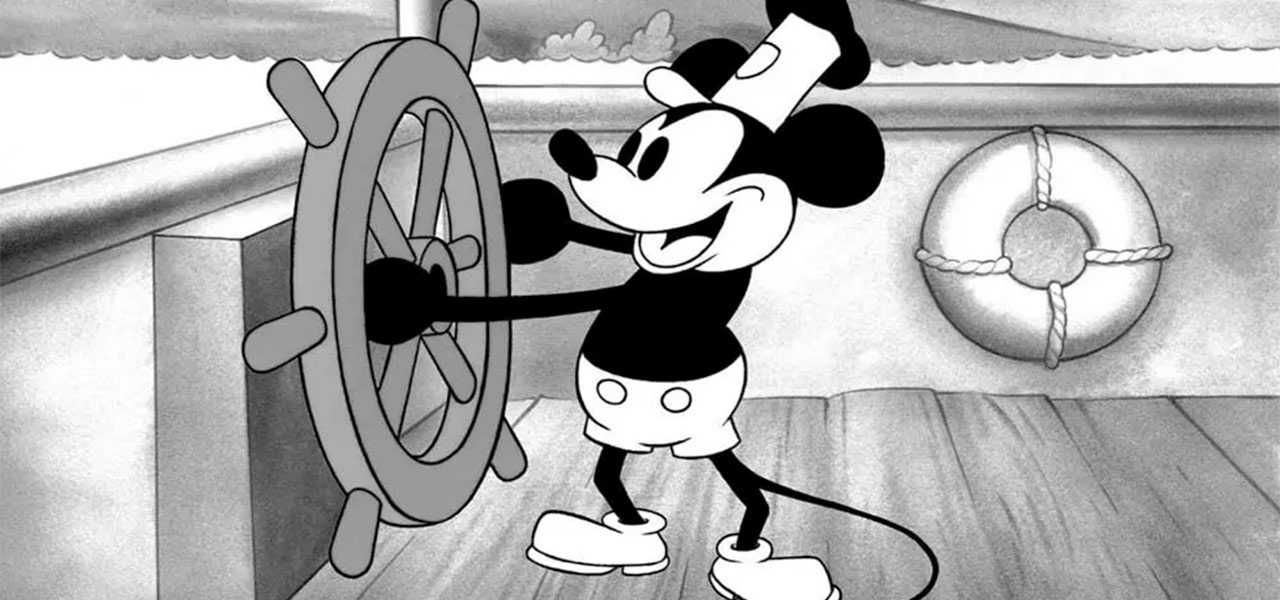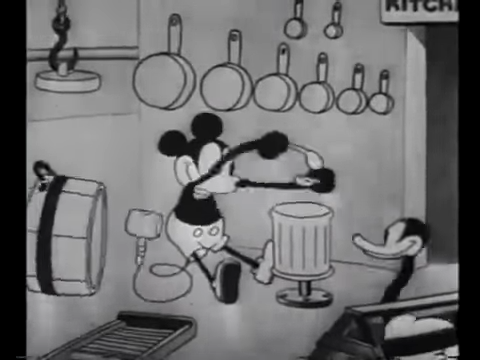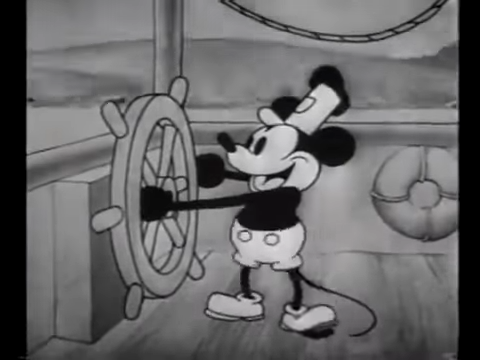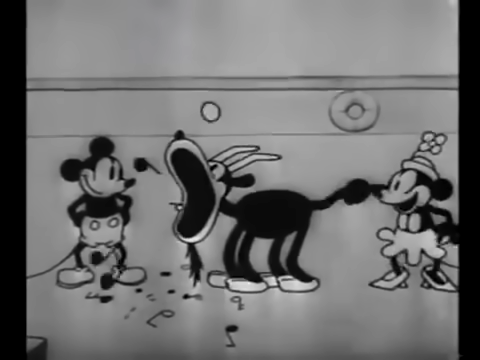
If you’ve been wishing on a star for the chance to include the 1928 original, black & white Mickey and Minnie Mouse characters in a venture of your own design, legally, well then 2024 is the year your dreams come true. After successfully getting congress to sign off on significant delays since 1984, Disney’s copyright on their earliest versions of Mickey and Minnie has finally expired. It turned into a pumpkin at the stroke of midnight on January 1. Unlike the debut cartoon, what happens now is not so black and white. Yes, the world at large can use the characters, but Disney still has many related trademarks in place. Plus, you know, it’s Disney. They’re gonna be aggressive about protecting their signature property. Since Mickey and Minnie are international stars, BBC reported on the news:
1928 Mickey is up for grabs: It was the animation that launched the House of Mouse. Steamboat Willie, a 1928 short film featuring early non-speaking versions of Mickey and Minnie, is widely seen as the moment that transformed Disney’s fortunes and made cinema history. Their images are now available to the public in the US, after Disney’s copyright expired. It means creatives like cartoonists can now rework and use the earliest versions of Mickey and Minnie. In fact, anyone can use those versions without permission or cost.
But hands off ‘more modern’ Mickey: Disney warned that more modern versions of Mickey are still covered by copyright. “We will, of course, continue to protect our rights in the more modern versions of Mickey Mouse and other works that remain subject to copyright,” the company said. US copyright law says the rights to characters can be held for 95 years, which means the characters in Steamboat Willie entered the public domain on Monday, 1 January 2024. Those works can now legally be shared, performed, reused, repurposed or sampled.
Disney delayed the expiration by 40 years: Disney has faced losing the copyright over its original cartoons several times in the past. The characters were first expected to go into the public domain in 1984, but Congress extended the term by 20 years. Before the next expiry date came up in 2004, another 20-year extension was passed. Disney’s efforts to protect its characters have even led to the law being dubbed ‘the Mickey Mouse Protection Act”. But the moment has finally come.
A ‘deeply symbolic’ moment: Jennifer Jenkins, director of the Duke Centre for the Study of the Public Domain, told the BBC it was a “deeply symbolic and long awaited” milestone. “What that means for us is that as of 2024, anyone will be free to copy, share and build upon those original cartoons from 1928 and the characters within them,” she said. Jenkins said the moment was particularly significant because of Disney’s “perceived role” in the extension of the copyright term, which prevented its properties from going into the public domain for so long.
Some trademarks are still in place: Disney still separately holds a trademark on Mickey as a brand identifier and a corporate mascot. That means there are still limits on how the public can use these images, Jenkins said. “What I cannot do is start making merchandise and the same kinds of products that Disney sells,” she said. “So if I’m selling T-shirts with Mickey and Minnie on them, and someone seeing those T-shirts thinks erroneously that they’re getting a Disney product when they’re not, that’s what trademark stops.” So any use of Mickey Mouse that gives the impression he belongs to a brand other than Disney would still be a trademark issue.
Horror on the horizon? Jack Kendall, a 32-year-old digital content creator from Warwickshire who runs a YouTube channel for Disney news explainers, believes someone may try to give Mickey and Minnie the horror movie treatment. He likened it to when Winnie the Pooh entered the public domain and was turned into the R-rated horror film Blood and Honey, which was one of this year’s worst-rated films.
The House of Mouse will be watching: A Disney spokesperson said that ever since Mickey Mouse’s first appearance in 1928, people have associated the character with the company. “That will not change when the copyright in the Steamboat Willie film expires,” they said. “More modern versions of Mickey will remain unaffected by the expiration of the Steamboat Willie copyright, and Mickey will continue to play a leading role as a global ambassador for the Walt Disney Company in our storytelling, theme park attractions, and merchandise.” The company added that it would “work to safeguard against consumer confusion caused by unauthorised uses of Mickey and our other iconic characters”.
So the question is how the copyright entering the public domain will stand up in court against the other trademarks Disney has in place, protecting Mickey as their “brand identifier and corporate mascot.” Unfortunately, I’m a bit rusty on my US Copyright and Trademark Law. What I do know is that Disney has Scrooge McDuck levels of money (even after Bob Iger’s salary) to spend on lawsuits. It would take someone either brazen, foolish, or both to challenge Disney over “Steamboat Willie” Mickey in a public way. Someone one of you lovely commenters called a “chaos gremlin.” That’s right, folks. John Oliver first talked about this in April of last year, when Last Week Tonight staked an early claim on old Mickey. Sadly, we’ll have to wait until the show returns in February to see how they decide to taunt Disney next. But to anyone who doubts John Oliver’s commitment to chaos-gremlining, I have one word for you: pūteketeke.














I believe a horror video game centered on him has already been announced, so the horror movie should come soon enough, lol.
I need to think this through a little more and brush up on the current law. However, as a creative, my initial reaction is that when someone created something this iconic and it’s clearly theirs that they’ve used, etc. they should probably be able to own the rights for it and keep renewing until they decide to sell it / get rid of it. No matter how much money they have. I also think it should not be expensive to do so. No matter how much or little money they have or how you feel about whatever else they do. This is Disney’s and has been and is well known that it has been and is. It’s not like this is a drug patent.
It’s so hard for creatives to make money and not get ripped off and keep ownership. This could be precedent setting to give people without Disney’s resources a chance to protect what is their intellectual property.
The current laws are perfect if you want to ensure ongoing intergenerational wealth where grandchildren receive real-time financial benefits from artistic works created well before they, or even their parents, were born. Countries make choices through their copyright laws and the US is an outlier in this regard. I think it’s gross, but that’s just me.
You would have to be very careful with how he was drawn/presented to prevent infringing on the still existing copyrights. I wonder if it would be worth the time.
Yes, exactly. What does the 1928 animation expiration mean exactly anyway? Mouses similar to those depicted in the 1928 animation can be drawn, or the theme, plot content, dialogue, and similar likenesses of the characters in that animation can be replicated? 🤔🤷🏽♀️🖌⚖️
If I was a Disney executive, I would be less worried about something like horror and more worried about something explicitly vulgar/pornographic.
Pornos have done that for years under the guise of ‘parody’ and it’s protected under the constitution. Now they just don’t have to hide behind parody anymore. It’s unfortunate but hopefully we won’t see anything too vile.
I just watched a tik tok video where a woman said a small store had to remove hand painted Disney characters. When they were contacted by the Disney legal department. Mickey is always watching.
A day care center in Washington DC had to scour off an entire outside mural of Disney characters done by a local artist. How Disney found out about it is still a mystery, but, geez, a kids’ center?!?!
My guess is that you will be able to do actual fair use without worrying as much about Disney’s lawyers. Beyond that, good luck.
Fascinating